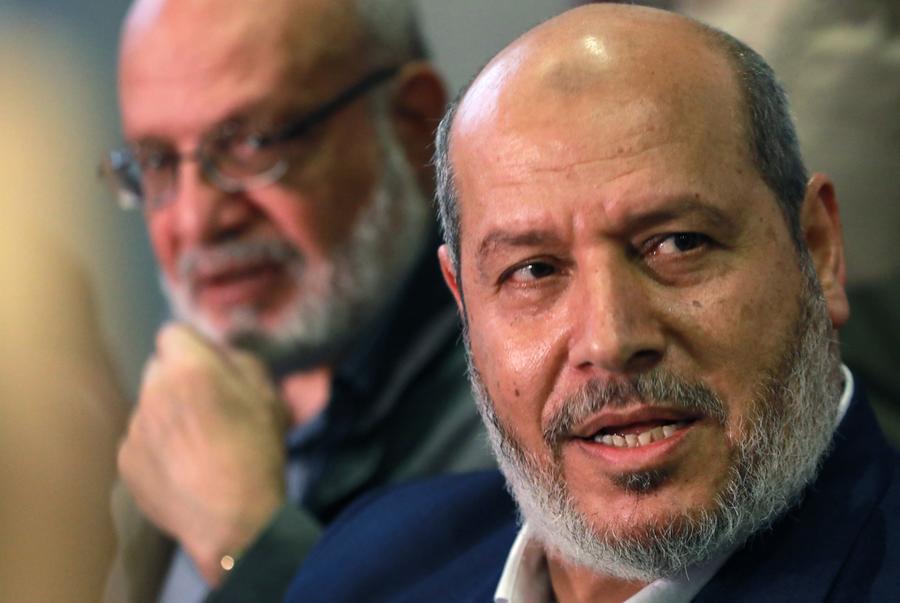Politics
Hamas Conditions Disarmament on End of Occupation, Al-Hayya Claims

Khalil al-Hayya, the acting co-chair of Hamas’ political bureau, has stated that the group will only disarm if the “occupation” of Palestinian territories comes to an end. This declaration appears to contradict the framework established in the US-backed peace plan proposed by former President Donald Trump, which stipulates that Hamas would disarm following the return of hostages and the withdrawal of the Israel Defense Forces (IDF) from Gaza.
In an interview with Al Jazeera, al-Hayya emphasized that disarmament is “linked to the presence of the occupation and aggression.” He further asserted that Hamas would only lay down its arms “if the occupation ends.” The term “occupation,” as defined by Hamas, often encompasses the very existence of Israel, complicating any prospects for peace.
Hamas and Palestinian Unity Efforts
During the same interview, al-Hayya announced that Hamas had reached an agreement with rival Palestinian factions, including Fatah, to establish a technocratic governing committee aimed at administering Gaza. However, he did not provide details regarding the timeline or the structure of this committee, nor whether Hamas officials would be involved in its operations. This announcement has sparked tension, particularly as both Israel and the United States have previously stated that Hamas should not have a role in Gaza’s future governance.
Fatah, the leading party in the Palestinian Authority, contradicted al-Hayya’s claims last week by dismissing the idea of a governing committee and reinforcing that the PLO remains the only legitimate entity to lead both the West Bank and Gaza.
Regional Perspectives on Peacekeeping
In a related development, Jordan’s King Abdullah addressed the proposed inclusion of an International Stabilisation Force (ISF) in the peace plan during an interview with the BBC. Countries such as Indonesia, Pakistan, and Azerbaijan are expected to contribute troops to this force. Nevertheless, Israel has insisted that it must retain veto power over the involvement of any nation, particularly in light of concerns about potential Turkish military presence—an issue Prime Minister Benjamin Netanyahu regards as a “red line.”
King Abdullah expressed skepticism about the feasibility of enforcing peace in Gaza through the ISF. He stated, “What is the mandate of security forces inside of Gaza? We hope that it is peacekeeping, because if it’s peace-enforcing, nobody will want to touch that.” The King highlighted the importance of supporting local Palestinian police forces, which Jordan and Egypt are prepared to assist in training. However, he cautioned that active military patrols would deter international involvement, saying, “If we’re running around Gaza on patrol with weapons, that’s not a situation that any country would like to get involved in.”
As discussions continue, the prospects for peace in the region remain uncertain, with divergent views among key players complicating the path forward.
-

 Business1 week ago
Business1 week agoIconic Sand Dollar Social Club Listed for $3 Million in Folly Beach
-

 Politics2 weeks ago
Politics2 weeks agoAfghan Refugee Detained by ICE After Asylum Hearing in New York
-

 Health2 weeks ago
Health2 weeks agoPeptilogics Secures $78 Million to Combat Prosthetic Joint Infections
-

 Science1 week ago
Science1 week agoResearchers Achieve Fastest Genome Sequencing in Under Four Hours
-

 Lifestyle2 weeks ago
Lifestyle2 weeks agoJump for Good: San Clemente Pier Fundraiser Allows Legal Leaps
-

 Health1 week ago
Health1 week agoResearcher Uncovers Zika Virus Pathway to Placenta Using Nanotubes
-

 World2 weeks ago
World2 weeks agoUS Passport Ranks Drop Out of Top 10 for First Time Ever
-

 World1 week ago
World1 week agoRegional Pilots’ Salaries Surge to Six Figures in 2025
-

 Entertainment2 weeks ago
Entertainment2 weeks agoJennifer Lopez Addresses A-Rod Split in Candid Interview
-

 Business2 weeks ago
Business2 weeks agoSan Jose High-Rise Faces Foreclosure Over $182.5 Million Loan
-

 Science2 weeks ago
Science2 weeks agoMars Observed: Detailed Imaging Reveals Dust Avalanche Dynamics
-

 Top Stories1 week ago
Top Stories1 week agoChicago Symphony Orchestra Dazzles with Berlioz Under Mäkelä









